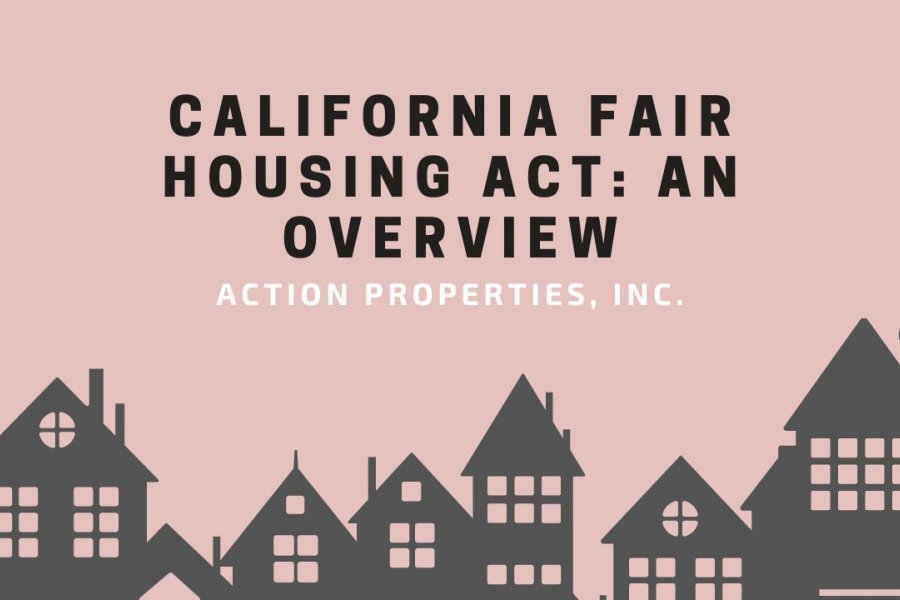
If you want to be a successful landlord in California, you have to understand and comply with the state's landlord-tenant laws, which regulate issues such as rent increases, security deposits, evictions, and fair housing.
In this blog, we’ll cover federal and California state fair housing laws. We will discuss what a protected class is, the prohibited practices, and the consequences of violating the law. Keep reading to know your rights and responsibilities so you can protect yourself and learn the importance of treating your California residents fairly.
What Is the Fair Housing Act and Why Is It Important?
The Federal Fair Housing Act is a federal law that protects individuals from housing discrimination based on the protected classes of race, color, religion, sex, familial status, or any physical or mental disability. This law applies to both rental housing and homeownership. In California, there are additional protected classes.
Everyone deserves the right to live in a safe and secure place, free from housing discrimination. Under California state fair housing laws, there are certain protected characteristics such as race, color, religion, sex, disability, age, marital status, and family status.
California fair housing laws allow everyone to have the same opportunity to find safe and secure housing regardless of their background or identity.

Why Should You Care?
As a landlord, you should care about California fair housing laws because the success of your business depends on it. You might have to pay a fine if you violate California fair housing law. Additionally, you may lose your license. Here are three things that the Federal Fair Housing Act is focused on:
No Discrimination
The Fair Housing Act makes it illegal for housing providers and homeowners to discriminate against individuals who are looking for housing. This means that landlords and homeowners cannot refuse to rent or sell a house based on a person's race, color, national origin, religion, sex, familial status, sexual orientation, or disability.
Equal Treatment
In addition, fair housing laws also prohibit any housing provider from charging higher rents based on any protected class.
Fair Advertising
It is also prohibited by federal law for landlords to advertise their property in a way that counts as housing discrimination against certain individuals. This means that a landlord cannot advertise a property in a way that only attracts certain groups, such as "no children allowed".
Who Oversees Fair Housing in California?
The Department of Fair Employment and Housing is responsible for enforcing fair housing in California. The department has the authority to investigate complaints of housing discrimination and can impose fines or other penalties on landlords or homeowners who violate the anti-discrimination law.

What Discrimination Does Fair Housing Prohibit?
Illegal housing discrimination is defined as any action taken by a landlord, real estate agent, or other person trying to unfairly prevent or limit access to housing.
Discrimination can take many forms, from subtle forms of exclusion to outright bigotry. For example, steering potential tenants away from certain neighborhoods due to their race. This type of discrimination is illegal under the Fair Housing Act.
In California, there are 15 protected classes:
- Race
- Ancestry or national origin
- Citizenship or immigration status
- Primary language
- Age
- Religion
- Disability, mental or physical
- Sex, gender
- Sexual orientation
- Gender identity, gender expression
- Genetic information
- Marital status
- Familial status
- Source of income
- Military or veteran status
There are some exemptions to these laws in California. For example, housing built specifically for seniors is allowed to deny renters under a certain age. However, if you own a standard single-family property or an apartment building with multiple housing units, these exemptions will not be relevant.
Best Practices to Ensure Fair Housing
There are a number of things you can do to ensure you are following California fair housing laws.
1. Know the Laws
As a landlord in California, it is important to familiarize yourself with the Federal Fair Housing Act and understand the rules and regulations it sets out for landlords. This includes understanding the protected classes and the rules associated with them.

2. Advertise Fairly
State law in California dictates that landlords should ensure all advertisements for apartments or homes are free from any discriminatory language or images. This includes all online postings and printed materials.
3. Treat All Prospective Tenants Equally
California landlords should ensure that all prospective tenants are treated equally and fairly according to federal law, regardless of their race, color, religion, sex, national origin, familial status, or disability.
4. Maintain Equal Access
Landlords should provide equal opportunity to all tenants, including those with disabilities. This includes providing reasonable accommodation for tenants with disabilities, such as accessible parking or reasonable modifications to your property for those with mobility issues. You are also not allowed to charge a pet deposit for a service animal that a disabled person rentinf from you may require.
5. Follow Fair Screening Practices
Use the same criteria to screen all tenants and do not commit discrimination against any tenants based on their race, color, religion, sex, national origin, familial status, or disability.
6. Comply with State and Local Laws
Be aware of any state and local fair housing laws that may impose additional requirements or provide additional protections for tenants.
7. Keep Records
You should keep records of all tenant applications and communications to ensure they are complying with California fair housing laws.
Bottom Line
The Fair Housing Act from the Department of Fair Employment and Housing is an essential component of California's rental housing landscape. It's important for you to understand your rights and responsibilities under the law.
Landlords in California must take steps to ensure their rental policies comply with the Fair Housing Act. It is also essential that you become familiar with landlord-tenant laws in your local area. Knowing your local laws can help you protect yourself from potential legal issues regarding discrimination.
We know this can feel overwhelming. That’s why Action Properties is here to help with our services. We are well-versed in California landlord-tenant laws and can make owning a rental unit easier than ever. Contact us today to learn more about our property management services!
This blog should not be used as a substitute for legal advice from a licensed attorney in your state. Laws change, and this post might not be updated at the time of your reading. Please contact us for any questions you have in regards to this content or any other aspect of your property management needs.